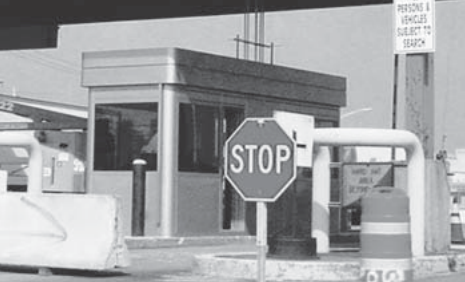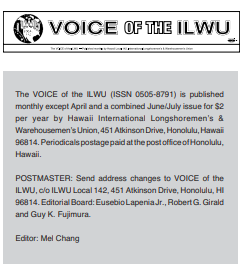CONTINUED FROM PAGE 1 Act which threatens to undermine many of our constitutional rights. In his speech to the Convention, Remar focused on how these new laws affect dock workers.
There’s lot of changes happening in the area of transportation, in particular. There’s several new laws that have been passed. You’ve heard about the first one. The U.S.A. Patriot Act. It’s gotten some press, hopefully you’ve heard about some of the repressive pieces of that legislation. It provides for such things as the FBI and other intelligence agencies of the government to be able to, without a warrant, and without really much in the way of any cause, snoop around and do surveillance. They can even monitor the types of books that people are pulling out of libraries and reading on the Internet. These are some of the features of the U.S. Patriot Act. But I’m going to be focusing on how these national security laws actually directly impact on workers.
There’s a piece of the U.S.A. Patriot Act that requires all drivers of hazardous materials or all drivers of vehicles that have the capacity to carry 16 passengers to be subject to new security background checks. There’s going to be all sorts of new requirements for security measures in the ports and in all modes of transportation. I’m talking not just about air travel which is the obvious one since 9/11, but rail, trucking, maritime, any operation on any vessel, all longshore work, any worker going in and out of a port is going to be subject to these rules.
ILWU deals with the issues
Before I get into the particulars, let me tell you about what the ILWU has been doing. The ILWU was the first union to deal with these issues, sending people to Congress to lobby for worker rights and protections. We testified before Congress. We met with the Secretary of Transportation and with other government officials.
The ILWU went to Washington DC in October 2001 and attended a critical meeting of organized labor which was the Transportation Trades Department. This is the group within the AFL-CIO that has the affiliates of all international unions that represents workers in transportation trades. They had no policy and no position on any of these issues until the ILWU made a formal motion and a presentation of a fourpoint plan for organized labor to deal with this new wave of national security.
Not all national security is illegitimate. There’s a lot of critical things that need to be done to protect the people from random acts of terrorist violence. There’s a lot of important security measures that need to be instituted but they cost money. To have proper screening you have to slow down commerce a little bit. To do inspections, anybody that’s ever been in an airport knows things slow down in order to have that kind of security. That’s the price you pay.
That’s one of the points that the ILWU and organized labor has been pressing for real security, not phony security. Phony security is making great announcements about fighting terrorism wherever it may be without doing a damned thing about it. Phony security is identifying the entire American workforce as potential terrorists and treating them likewise. That’s phony security.

Transportation Worker Identification Credential (TWIC) cards are being tested at the Port of Wilmington in Delaware and at Long Beach, California. The cards are part of a security system that will control access to secured areas by matching the cardholder to biometric information such as fingerprints or photographs.
One of the other points the ILWU proposed is to deal with this question of background checks. The ILWU and thankfully the AFL-CIO got behind a proposal to at least try and establish in writing certain basic protections in this new wave of legislation. We argued long and hard in front of Congress to amend the legislation. We submitted commentaries on the legislation. We pressed, we pressed, and we pressed. The U.S.A. Patriot Act was passed four or five weeks after 9/11. It was like a bullet shooting out of a gun. It came so quickly nobody had any opportunity to do anything to change that bill and there’s no protections in it whatsoever. We got our chance with the Maritime Transportation Security Act. That’s the second major piece of legislation that Congress adopted. In there, it says all port workers are going to be subject to background checks and transportation security cards.
TWIC Cards
Let me talk about transportation security cards. It’s called “TWIC” for Transportation Worker Identification Credential. You’ll hear a lot about it because those of you who are in transportation are going to be carrying one if you want to continue to work in transportation. It’s the first time the federal government is establishing a national identification system. They are in the process of setting it up right now. It’s mandated by the U.S.A. Patriot Act and the Maritime Transportation Security Act.
What is the card? It’s designed to give positive and proper identification of all individuals who are going in and out of secured areas. It’s now being applied to railway yards, and it’s been applied to airports and airline workers and trucking. The card will be issued to all transportation workers who qualify.
What do you have to do to qualify? You have to go down to a federal government office. You have to give your fingerprints. You have to show proof of your identity. The FBI, under supervision of Attorney General John Aschcroft’s office, will do a criminal background check. If the background check reveals that you have been convicted of certain felonies within the last seven years, you will be disqualified from working in secured areas and in security sensitive areas.
What’s a secured area? For ports, they’ve left it up to the local port committees and authorities to designate what is a secured area, but the regulations indicate wherever cargo is being handled that’s going to be a secured area. That means virtually all marine terminals. Certainly all vessels are secured areas. If anyone is working in data information, inventory, or electronic information processing that’s related to transportation, that is now declared to be security sensitive information, which means you have to have a TWIC card. You have to go through the finger printing and the background check. You also have to be a legal resident.
They’ve listed the felonies that can get you disqualified. They are murder, treason, assault with intent to kill—the standard stuff. They also have possession of controlled substances, such as marijuana. This is how messed up and short sighted parts of this legislation really are. You have states like Texas where possession of up to 40 grams of marijuana is not a felony, but in other states, possession of as little as 10 grams is a felony. This is supposed to be a national identification card with national, uniform requirements, but as you can see, a disqualifying felony in one state may be different in another state.
What is the card going to look like? It’s going to be a biometrics card with the capacity for an optical eye scan in the future. It’s going to contain certain information about you. The card is going to be read at various physical locations within a port facility, along the transportation modes of trucking, rail and air. It will clear you to go in or not. It will also monitor and record where you’re going, when you’re going.
We did get some basic protections from Congress after some really hard work by a lot of good people. We have an appeal process now. People have a right to appeal if they are disqualified. You have the right to file for a waiver if you have a conviction in your record and you can show that you are rehabilitated, you’re a good worker, a good citizen, or you get letters of recommendation from your employer.
We got written into the law the right of a notice for a worker that’s affected by this and the right to an actual hearing. We are pressing for a legal type proceeding with basic due process so that, although the names and identities of people will be kept anonymous, the types of rulings will be public, so lawyers and organized labor can work with those rulings and make sure there’s fairness, there’s no discrimination, there’s uniformity. The law also allows alternate security arrangements for certain individuals who don’t qualify for the transportation worker identification card. What the specifics will be, we don’t know. The regulations on most of this is not finalized. There’s regulations that are in place for the hazardous materials, trucking industry and those regulations are pretty much going to be the model for all transportation industry modes.
Privacy rights
Privacy was another important issue that we fought hard to get into the legislation. There’s now a mandate in the law that wasn’t there before that says that no one, no public person, no one outside of the security background check itself is entitled to the information. The employer is specifically prohibited from using this information.
Also the government is specifically prohibited from using any of this information for any other purpose than simply being able to maintain positive identification of people going in and out of secured areas in the transportation industries.
It’s not all bleak. There are some
—continued on page 8

